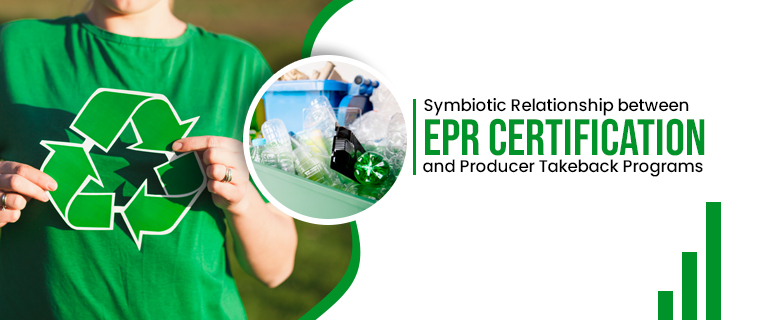Revolutionizing E-Waste Management Through EPR Certification
Electronic devices have become a necessary component of our everyday life in a time where technical improvements are the driving force. However, the rapid pace of innovation has led to a concerning surge in electronic waste, or e-waste. To tackle this environmental challenge, countries around the world are turning to EPR (Extended Producer Responsibility) certification, a transformative approach to electronic waste recycling. In this blog post, we'll delve into the significance of E-waste recycling and explore the process to apply for an EPR Certificate Online.
The Growing E-Waste Dilemma
The proliferation of smartphones, laptops, and other electronic gadgets has undoubtedly enhanced our connectivity and efficiency. However, the downside is the alarming amount of electronic devices being discarded annually. E-waste, which includes outdated gadgets and electronic components, poses a threat to the environment due to toxic materials like lead, mercury, and cadmium.
Enter Extended Producer Responsibility (EPR)
Recognizing the urgent need to address the escalating e-waste crisis, many nations are adopting EPR Registration as a cornerstone of their waste management strategies. EPR shifts the responsibility for the entire life cycle of electronic products from consumers to manufacturers. This holistic approach encourages producers to design products with recycling in mind, ultimately minimizing the environmental impact of electronic devices.
Read also this -: EPR Certification and the Green Supply Chain RevolutionThe Role of EPR Certification:
Central to the success of E-waste recycling initiatives is the implementation of EPR certification. This certification process ensures that producers and manufacturers are held accountable for the environmentally sound management of their electronic products. Companies can now apply for the EPR certificate online, streamlining the certification process and making it more accessible.
Applying EPR Certificate Online: A Game-Changer
The process to"Apply EPR Certificate Online" reflects the modernization of certification processes. Online application platforms make it easier for producers to adhere to EPR regulations efficiently. This streamlined approach fosters widespread compliance, as companies can navigate the EPR certification process with convenience and speed. The online application process is not only user-friendly but also encourages a broader participation of businesses in the global effort to address e-waste.
Benefits of EPR Certification:
1. Environmental Stewardship:
EPR certification plays a crucial role in promoting environmental stewardship by holding producers accountable for the entire life cycle of their electronic products. This certification ensures that companies adopt responsible e-waste management practices, preventing harmful materials from ending up in landfills. Electronic devices often contain hazardous substances, including lead, mercury, and cadmium, which can leach into the soil and water if not properly handled. EPR encourages the safe disposal, recycling, and treatment of electronic waste, mitigating the potential environmental hazards associated with improper disposal methods. The certification, therefore, aligns with global efforts to preserve ecosystems, reduce pollution, and safeguard the planet for future generations.
2. Circular Economy:
The application of EPR principles in the electronic industry is a cornerstone in the transition towards a circular economy. In a linear economy, products are manufactured, used, and discarded, contributing to the depletion of finite resources. EPR Registration encourages a circular approach where materials from discarded electronic devices are recycled, refurbished, and reused. By integrating recycled materials back into the production cycle, companies reduce their reliance on virgin resources, minimizing the environmental impact of resource extraction and reducing energy consumption associated with manufacturing new products. This shift towards a circular economy fosters sustainability by extending the lifespan of materials, reducing waste, and creating a more resilient and resource-efficient production system.
Read also this -: Communicating EPR Registration Efforts to Consumers3. Consumer Confidence:
EPR certification not only benefits the environment but also enhances consumer confidence in electronic products and the companies producing them. When consumers see that a company has obtained EPR certification, it signals a commitment to sustainable practices and responsible waste management. This demonstration of environmental responsibility resonates positively with environmentally conscious consumers who prioritize purchasing products from socially and environmentally responsible companies. The assurance that a company is actively working to reduce its environmental footprint fosters trust and loyalty among consumers, contributing to a positive brand image. In today's competitive market, where consumers increasingly value sustainability, EPR certification becomes a valuable asset for companies seeking to differentiate themselves and build lasting relationships with their customer base.
To sum up, the benefits of EPR certification extend beyond regulatory compliance. They encompass environmental preservation, the promotion of a circular economy, and the cultivation of consumer trust—all of which are vital elements in the pursuit of a sustainable and responsible electronic industry.
Conclusion:
As electronic devices continue to advance, so must our approach to managing the resulting e-waste. EPR certification, especially when applied online, emerges as a pivotal tool in revolutionizing how we handle electronic products' life cycle. By encouraging producers to take responsibility and apply EPR certificates online, we pave the way for a more sustainable, eco-friendly future—one where electronic innovation coexists harmoniously with environmental preservation.




Comments
Post a Comment